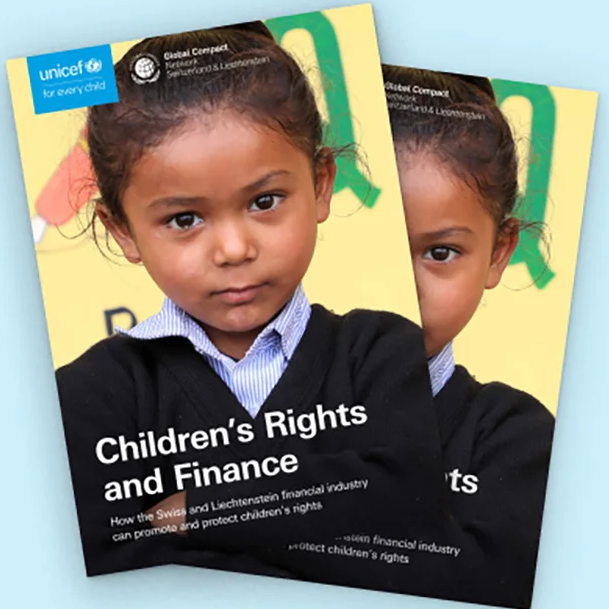Setting the course. How the financial sector can protect children's rights
Do you know how the financial sector can influence children's lives and protect their rights? Today we are presenting a new study that analyzes the influence of the financial sector in Switzerland and Liechtenstein (banks, asset managers, insurance companies) on children's rights. This study was published by UNICEF Switzerland and Liechtenstein and the UN Global Compact Network Switzerland and Liechtenstein and conducted by ECOFACT AG.
Childhood shapes | Children play an important role in society. Every child has rights and needs that must be protected. These include the right to life, health, education and play. Children are more vulnerable and have special needs because their physical, mental and emotional development is not yet complete. The impact of business on children is different from that on adults - it can be more severe, more serious and more long-term. Negative impacts during this time can have lifelong and irreversible consequences, while positive measures in favor of children bring long-term social benefits. Entrepreneurial activity - regardless of company size, geographical location or sector - influences the rights of children along the entire value chain, both positively and negatively. Children are affected in many ways: Directly ...
The UN Convention on the Rights of the Child
Principles for children's rights and corporate action
Why is UNICEF focusing on the financial sector? | Financial institutions have a major impact on children's rights. Sie spielen eine zentrale Rolle in der Realwirtschaft, indem sie Kapital bereitstellen, Investitionen tätigen und Risiken absichern. Durch ihre Produkte und Dienstleistungen sind sie zudem mit Unternehmen verbunden, deren Produkte und Geschäftspraktiken die Rechte von Kindern positiv oder negativ beeinflussen können. Durch Spar-, Zahlungs- oder Versicherungsprodukte für Kinder und Jugendliche haben sie ausserdem in direkter Verbindung. This study focuses on banks, asset managers and insurance companies from Switzerland and Liechtenstein and aims to raise awareness of corporate responsibility in the area of children's rights. he study assesses the impact of the business activities of these financial institutions on children's rights, identifies important levers for promoting child rights-friendly business activities and provides concrete recommendations for action.
UN Guiding Principles on Business and Human Rights
OECD Guidelines for Multinational Enterprises on Responsible Business Conduct
It's about more than child labor | While most financial institutions surveyed acknowledge their responsibility to respect human rights, they give little consideration to the specific rights of children - particularly beyond the issue of child labor - and do not take sufficient protective measures. Children's rights are often seen as only a subset of human rights in global supply chains, which can lead to financial institutions not taking them fully into account when pursuing their business objectives. In addition, children's rights are not considered sufficiently material for the financial sector and compete with other sustainability issues such as climate change and biodiversity. Implementation is complicated by the broad topic of “children's rights”, insufficient data, perceived lack of influence and limited resources.
UNICEF tool for the consideration of children's rights in ESG assessments for investors
Recommendations | In spite of these limitations, financial institutions are well
positioned to improve the situation of children.
Recommendations to banks, wealth and asset managers, and insurance companies:
- Apply a “child-lens approach” to governance, strategy, risk management, and products and services, and commit to upholding children’s rights
- Consider children’s rights in the double materiality assessment and disclose accordingly
- Recognize the positive and negative impacts of all financial products and services on children (directly and indirectly via parents and caregivers); when material adverse impacts are possible, conduct due diligence
- As part of sustainable or ESG investing strategies, conduct positive screening to identify companies with an above-average performance in relation to children’s rights and create innovative products
- Improve stewardship and engagement with clients and investee companies t ...
Child-Lens Investing Framework






